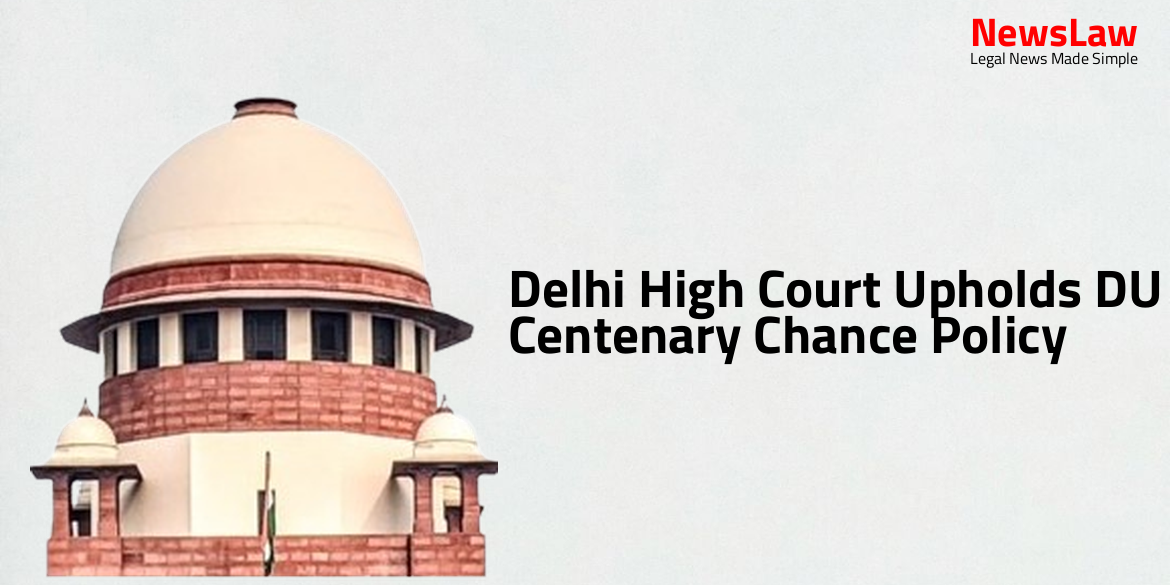This case summary delves into the exceptional legal analysis carried out by the courts in a challenging dispute regarding supply disconnections. Discover how the courts meticulously examined the legal provisions, orders, and arguments presented by the parties to render decisions on the contentious issues at hand. Stay tuned to understand the nuanced legal reasoning that shaped the outcomes in this intricate legal battle.
Facts
- Supply to the company was energised on 06.05.2005 with a contract demand of 1,000 KVA.
- Multiple instances of disconnection and subsequent reconnection due to non-payment of bills, including AMG and DPS charges.
- Several writ petitions and orders issued by the Forum in response to non-payment and disconnection issues.
- Disputes between the company and the Board regarding payment of Annual Minimum Guarantee (AMG) and other charges.
- Prolonged periods of disconnection and legal challenges by both parties in the High Court.
- Instances of partial payments made against outstanding bills.
- Continued disputes over billing amounts and deadlines for payment.
- Interim orders and interim deposits required for reenergising supply.
- Discrepancies in disconnection dates and the restoration of supply.
- The Single Judge found the act of disconnection without considering the request for instalments was unwarranted.
- Default on the part of the company did not constitute neglect to pay as contemplated in Section 56 of the 2003 Act.
- The Appeal Bench found that the bill dated 19.3.2008, which included AMG and DPS for a specific period contrary to the Forum’s order, was illegal.
- Subsequent disconnection on 2.4.2008 was deemed illegal.
- The Board persisted in defying the Forum’s order by including charges disallowed and undertaking subsequent illegal billing.
- The authoritarianism of the Board persisted despite challenges by the petitioner before the Forum and the Court.
- The Board disconnected supply multiple times in disregard of legal orders, which the industry challenged through legal means.
- Minimum charges and demands raised contrary to the Forum’s order were deemed illegal by the Single Judge.
- The conduct of the Board was found to be grossly wanting in both aspects.
Also Read: Legal Analysis: Ownership Dispute and Validity of Will Deed
Issue
- Company requested instalment payment to liquidate dues, accepted by Board
- Agreement executed between Company and Board for liquidating outstanding dues in ten instalments
- Issue of permissibility of supply disconnection despite Forum’s stay order
- Company’s requirement to pay AMG charges during supply disconnection period questioned
- Petitioner given liberty to pursue matter before the appropriate authority
Also Read: Analysis of Curative Jurisdiction in Legal Dispute
Arguments
- Counsel for the Board acknowledged Forum’s jurisdiction to adjudicate the dispute before the Appeal Bench.
- Even if the concession made before a judicial forum does not bind a party, there is no legal bar on the Redressal Forum from adjudicating the dispute.
- Section 42(5) of the 2003 Act mandates distribution licensees to establish a forum for redressal of grievances of consumers within six months.
- The term ‘consumer’ is defined in Section 2(15) of the 2003 Act.
Also Read: Contractual Interpretation in Real Estate Dispute
Analysis
- The statutory Forum found that the respondent company was obligated to pay AMG charges as per the first bill.
- The supplier has the power to disconnect supply under Section 56 of the Act if the consumer neglects to pay their dues.
- The High Court held that the respondent company did not neglect to pay their dues, thus disconnection was not warranted.
- Representing for instalments after a notice of disconnection was considered as a plea for mercy.
- Cases were referenced where genuine disputes over dues did not amount to negligence.
- The consumer was agreed instalments to clear dues and restore supply, which was in line with the Act.
- The circular issued by the Board regarding disconnection and reconnection was interpreted in favor of the company by the Redressal Forum.
- The Board’s contention of partial modification of terms and conditions of supply was not accepted in light of the independent arrangement with the company.
- Supply to the company was disconnected again on 2nd April 2008.
- The consumer cannot terminate the agreement before three years from the start of energy supply.
- The definition of consumer from the Consumer Grievance Redressal Forum and Electricity Ombudsmen Regulation, 2006 was referenced.
- The definition includes individuals using electricity supplied by a licensee for personal use, those whose premises are connected for electricity reception, those disconnected by a licensee, and those applying for a connection.
- The company retains the right to approach the forum despite this clause.
- The case involved default in payment of dues on account of rent.
- Eviction could be asked for due to the default in payment of rent.
- It was not a case of default to pay simpliciter.
- The rigours of the default provision leading to eviction under the applicable rent law were diluted.
- Acceptance of plea for instalment payment after a long pending period was considered reasonable.
- High Court’s finding of arbitrary disconnection on 8th September 2006 was supported.
- Company’s willingness to pay demonstrated through acceptance of instalment agreement.
Decision
- Appeals filed by the Board dismissed.
- All connected applications disposed of.
- Decision of the Courts below not disturbed.
- Judgment of the Division Bench of the Patna High Court sustained.
Case Title: BIHAR STATE ELECTRICITY BOARD ETC. Vs. M/S ICEBERG INDUSTRIES LTD. AND ORS. ETC. (2020 INSC 371)
Case Number: C.A. No.-007649-007651 / 2019



